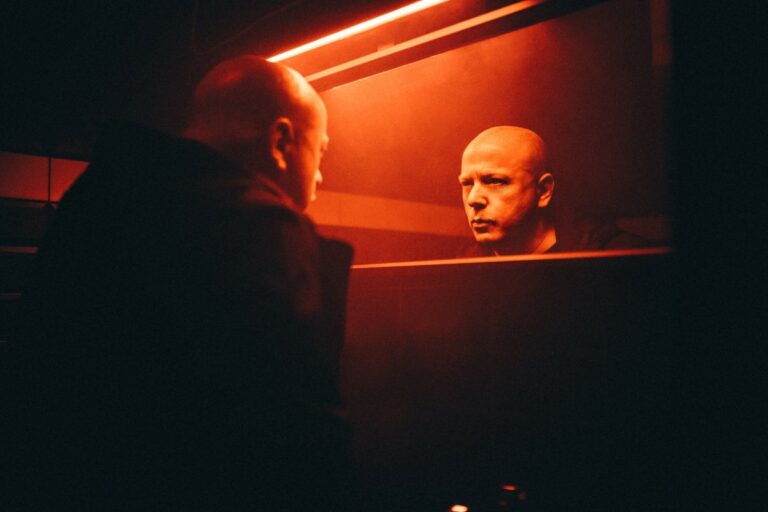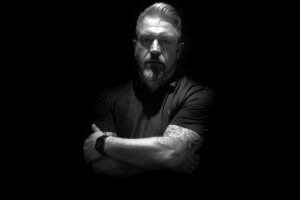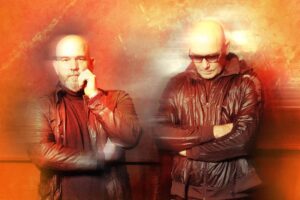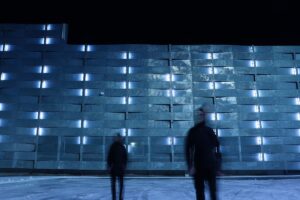A humanist beat has coursed through VNV Nation’s music for nearly three decades. Even at the band’s darkest moments—carrying swords through battlefields, burning paradise to the ground, racing towards the end of days—the never ending light loomed ahead, always reminding mankind of it’s great potential. Mastermind Ronan Harris has made a mantra of thoughtful, life affirming moments, insisting that the light ahead will always be.
One can look at humanism in a number of ways. It’s a belief in the human spirit, that we can achieve greatness via compassion and empathy for ourselves, our natural world, and our fellow man. That spirited philosophy has turned VNV into a global phenomenon for the goth set and made underground hits out of songs like “Illusion” and “Beloved.”
But one can also think of humanism as a rejection of sorts. It refutes the possibility of a supernatural god and the afterlife. It repudiates mainstream religious practices and the evangelical systems that remain the root cause of greed, conflict, inequality, and the rest of the world’s ills.
That’s where VNV Nation finds itself on its eleventh studio album, Electric Sun, a phenomenal and contemplative release on par with VNV’s best.
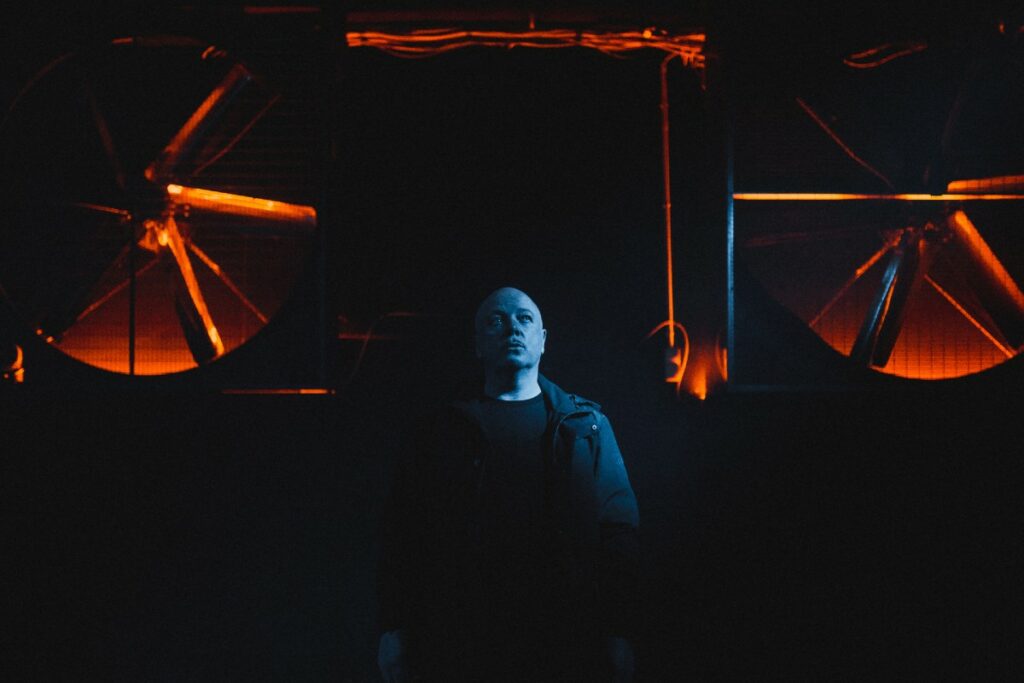
Can Electric Sun reignite the light?
It’s been five long years since VNV Nation’s last album Noire extinguished the never ending light. Immersed in darkness, mankind continues its dance. Ronan concluded Noire with his strongest condemnation yet—”I hope that their cries haunt you till the end”—and a grim outlook—”Dark clouds have gathered to block out the sun.” Electric Sun pulls at those threads.
When the title was announced, I thought the clouds might part and we’d witness the return of the never ending light, rekindled by the brilliant flames of the sun. How wrong I was. The sun burns bright overhead, but VNV’s optimism has burned out. Electric Sun finds Ronan Harris at his most cynical.
Some choice lines from the new album: “in a world that knows no love,” “time is running out,” “what I know and love is gone.” It’s bleak.
VNV albums past carefully balance dire tidings with songs of self-affirmation. On my personal favorite, “Resolution” from the album Automatic, Ronan implores: “Raise your head up high so the heavens hear you cry.” On Noire, it was “Armour:” “When it feels I can’t go on, let your armour cover me.”
Moments like these are difficult to find on Electric Sun. At one point, Ronan declares “the problem begins with you.” We realize we’re a long way from “the world is just illusion trying to change you,” and we turn inward, contemplating what we did wrong.
Electric Sun follows a three-act structure
Electric Sun is an album about god, humanity, love, and the loss of great potential. The title track opens the album with cinematic ambitions.
We’re introduced to the Electric Sun, a wrath ringed in flames, looking down upon us. One can consider the Electric Sun a character. In some respects, it’s a deity that provides life—its light and heat make life possible on earth, and we couldn’t exist without it. But given Ronan’s history of humanism, the sun can also be considered part of the natural order of things, and we must nurture it the same way we do other living beings.
Ronan’s voice on “Electric Sun” croons like a lounge singer—I’ve never heard him sing this way. He stretches out the word “dreaming” into untapped fervor as string sounds swell. It plays like a James Bond theme.
With the mood set, the rest of the album unspools like a carefully constructed storyline in three acts: setting, conflict, resolution. Like the greatest of stories, it begins with creation.
The majestic first single “Before the Rain” imagines the origin of the universe not as divine providence, but as an issue of love. It’s telling that this is the only instance on Electric Sun that Ronan references the light. Here, it’s an unstoppable force, one capable of greatness.
Place setting continues on “The Game,” as pianos tinkle, and on “Invictus,” which finds Ronan declaring, “Long may we endure.” It’s Electric Sun at its most confident, a call to change the world. This is the VNV we know and love, and “Invictus” is one of the album’s most comforting moments.
Dark beats pound, Ronan roars
The pace and the plot thicken with “Artifice,” one of the album’s requisite bangers. Among window-shattering bass and vibrant synths, Ronan unleashes conflict: “There’s no use crying about a world that’s dying.” I suspect “Artifice” will replace immortal VNV club hits like “Chrome” and “Control” on DJ playlists.
The album’s most visceral moment comes courtesy of “Prophet,” another energetic banger with pounding beats and frenetic sound effects that should blow up dance floors. Ronan sings here in first-person, not as himself but as an evangelical peddling redemption. The price: complete devotion and loss of our autonomy. We’ve reached the villain era of Electric Sun.
On second single, “Wait,” we wallow in apathy. Ronan, pissed off at the state of things, delivers the word “wait” with real menace. He finds mankind doing nothing but watching and waiting while our world ignites around us. The song’s final couplet, “The waters rising to our necks, and all we do is wait,” suggests global warming, though Ronan is clever enough to let you make of it yourself.
VNV Nation loses hope
The final act of Electric Sun begins with “At Horizon’s End,” but it may not offer the resolution you expect. We return to the cosmos to contemplate what went wrong. Among heavenly chimes, Ronan’s words come closest to reigniting the never ending light: “For all who are lost can always be found.” His sensitive vocals shine here with the same prowess he demonstrated on the title track—”At Horizon’s End” is one of the loveliest songs I’ve ever heard.
I’m genuinely surprised Electric Sun doesn’t close with “At Horizon’s End.” We’ve come to expect an element of salvation from VNV. But Ronan makes thoughtful choices about sequencing his albums, and there are still three tracks to go.
Fan favorite “Run” offers more of the “land I love is gone” pathos amid dark and unsettling beats. The snare reminds me of the drums from “All Our Sins.” Meanwhile, “Sunflare” further laments the loss of love and life as Ronan says goodbye.
Electric Sun upends a long-running VNV formula by closing with an instrumental rather than the effervescent catharsis of songs like “Perpetual” and “Where There Is Light.” It’s brief—barely three minutes—but the electronic bagpipes of “Under Sky” play like a funeral lament, and we’re left to wonder if Ronan is in mourning. But what is it he mourns?
I believe he mourns the loss of humanity. He no longer perceives the great hope of the human spirit. Mankind has turned its back on the Electric Sun that shines above ands powers our great natural world. The love once capable of constructing the cosmos is lost.
It’s a startling and unsettling turnabout for an artist whose victory-not-vengeance ideology has long pressed us to achieve our greatest potential. As I sit with Electric Sun in its entirety, I find myself incredibly saddened for all of humanity, but especially for Ronan Harris himself. I hope he—and all of us—can one day rekindle the light.

